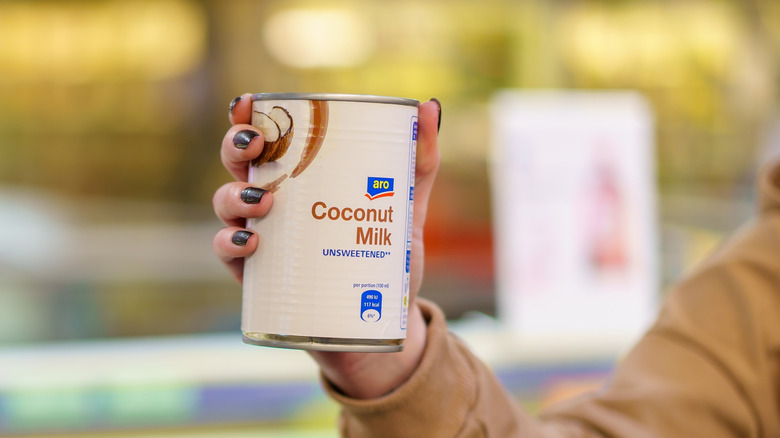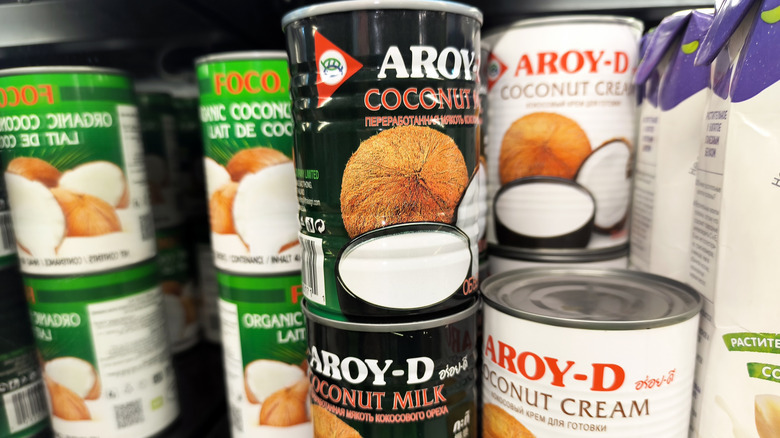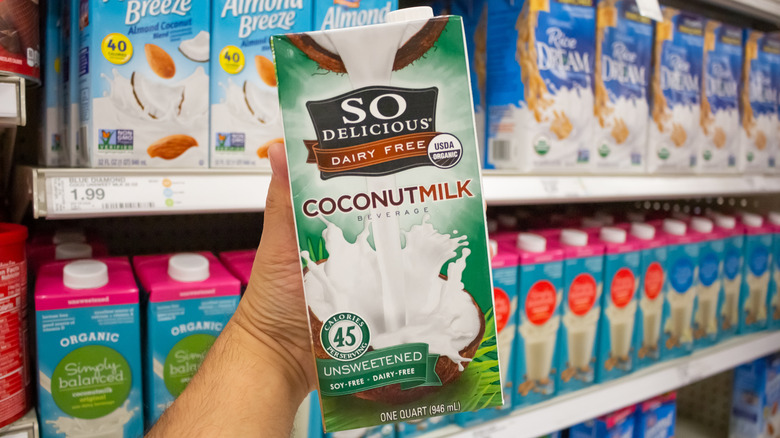Canned Vs Boxed Coconut Milk: Here's When To Use Each
Coconut milk is a versatile ingredient that gives dairy-free folks an alternative for their cold cereal and coffee. It also easily transitions from use in savory recipes — like Swiss chard coconut curry and coconut chicken tenders — to sweet applications like coconut milk whipped cream. In terms of culinary applications, there's not a whole lot this plant-based product can't be used for. But when you're picking some up to use in a recipe or to blend into your smoothies, how do you know which type to get? The store shelves are lined with both canned coconut milk and boxed varieties, after all. Figuring out which one to use can feel confusing, but it's actually pretty simple, as they each have distinct uses.
Contrary to popular supposition, coconut milk isn't a liquid sloshing around inside the fruits — that's coconut water. The product we call "milk" is actually derived from the flesh, which is shredded and then combined with water to create coconut milk (as well as coconut cream, which rises to the top). This process is what determines whether the product will wind up in a can or a carton — namely, the addition of water (how much versus how little) and additives that may or may not be integrated into the product. Most notably, the two distinguishing factors between canned and cartoned coconut milk are the amount of fat and texture.
Canned coconut milk has a higher fat content
Most recipes with coconut milk call for the canned product. It has a much higher fat content and less liquid. In fact, when you open the can, you'll typically find that the cream has collected in a mass at the top, with the milk lurking below it. It's the fattiness that makes canned coconut milk the most oft-prescribed addition to dishes rather than boxed milk, as it lends a rich creaminess and strong flavor.
When using canned coconut milk, some common applications are in Asian cuisine, especially Thai food and Indian dishes; in soups and stews; in puddings, non-dairy ice creams, and desserts that have a custard foundation; and in dips, marinades, and dressings. Really, any dish that needs some creaminess or fat to is a good candidate for canned coconut milk.
Canned coconut milk may contain an added stabilizer, such as guar gum or xanthan gum, but beyond that, it typically doesn't have much else besides coconut and water. Just be sure be sure not to confuse this full-fat variety with another canned coconut milk product, light coconut milk (often spelled as "lite" on the packaging). In addition to containing much less fat and a lot more water, the light milks also frequently contain a bunch of stabilizers and other additives, too — much more than the full-fat milk. Both factors — additives and reduced fat content — can greatly affect the flavor imparted to a dish, and the light version really just isn't a great choice. It's definitely not what a recipe is calling for when it lists a can of coconut milk among its ingredients.
Boxed coconut milk is a substitute for cow milk
Boxed coconut milk is more or less a substitute for animal-derived milk. Wherever you would use ordinary dairy milk — for drinking, in hot or cold cereals, in batters for baking, etc. — that's where coconut milk in a carton should be employed. It has a higher water content than the canned kind, giving it a more diluted flavor and a thinned-out texture for a more milk-like quality.
As we mentioned, its canned counterpart separates within the container into a thick mass of cream at the top and watery liquid below. Meanwhile, boxed milk retains its combined state and stays milk-like, even after a lengthy stint on the shelf. It often contains the kind of added nutrients that cow's milk has, such as calcium and vitamins, as well as other additives like thickeners, preservatives, and sometimes sugar.
Cow cream and cow's milk aren't interchangeable in cookery, largely due to their differences in fat content. Similarly, boxed coconut milk won't bring the same qualities to a dish that the canned product does. The lower-fat carton milk doesn't lend the creaminess and consistency typically needed for a recipe requiring coconut milk, which is why most recipes mandate the canned variety for cooking.



